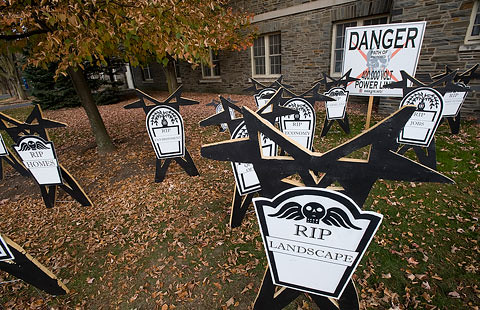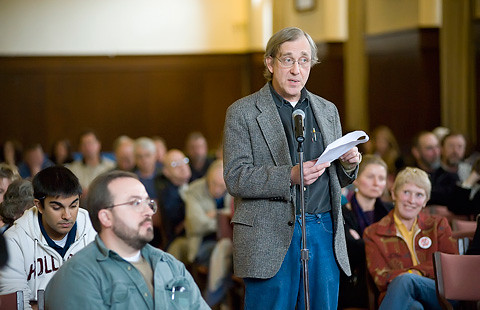Area residents flocked to ˛Řľ«¸ó on Monday to voice their opinions about a controversial power line that is proposed to run from central New York to the New York City area.
Two brief informational sessions led by state Public Service Commission staff members were followed by public hearings on the $2.1 billion project proposed by New York Regional Interconnect.
Two administrative law judges – Jeffrey Stockholm and Michelle Phillips – listened as dozens of residents stepped up to the microphone at the Hall of Presidents and talked about the 190-mile-long power line.
The overwhelming majority of the comments were negative, with residents questioning whether a thorough needs analysis for the project had been done, expressing concern about the impact on agriculture, tourism, and real estate values, its potentially adverse effect on area electricity rates, and possible health issues surrounding electromagnetic fields.
 |
| Groups opposed to the proposed power line set up a “graveyard” outside James C. ˛Řľ«¸ó Hall, where the hearings were held Monday. (Photo by Andy Daddio) |
“It’s a bad deal for New York, and it would be a tragedy for our area,” said Susan Tallman, who was worried about possible eminent domain proceedings.
Comments made at the hearings and those submitted in writing will become part of the formal public record, said Stockholm. The two administrative law judges make a recommendation about the NYRI application to the PSC, which will make the final decision.
The university’s Upstate Institute facilitated the hearings, which were the first of 13 scheduled to be held.
“The institute seeks to facilitate productive conversations about critical issues facing our region,” said institute director Ellen Kraly. “All Chenango Valley residents, in fact everyone in the state, need to consider the implications of the proposed power line.”
NYRI says the 1,200-megawatt line is needed to improve the state’s aging power grid and reduce the threat of blackouts like the one that struck the state in 2003.
But person after person at the public hearings argued against the project and strongly urged the PSC administrative law judges to recommend it be denied.
NYRI officials were present at the hearings but did not speak. The afternoon hearing drew about 75 people, and about 250 attended the evening session, according to campus safety officials.
 |
| Owen Tallman, of Hamilton, speaks against the NYRI proposal at the public hearing held Monday. (Photo by Andy Daddio) |